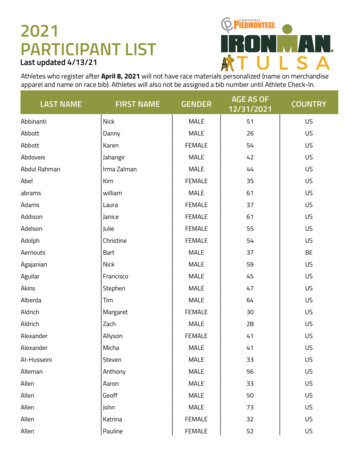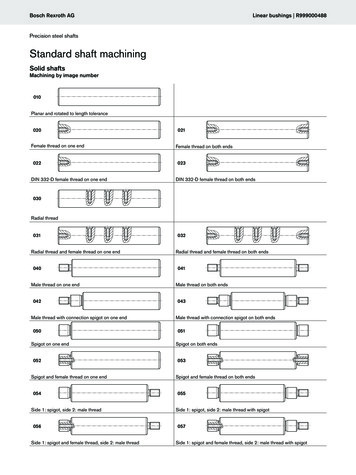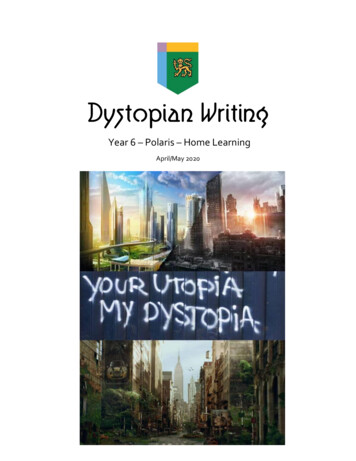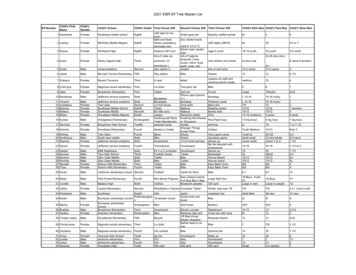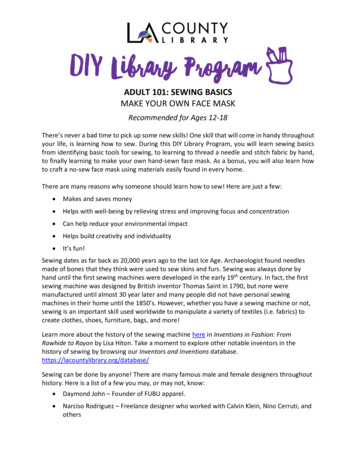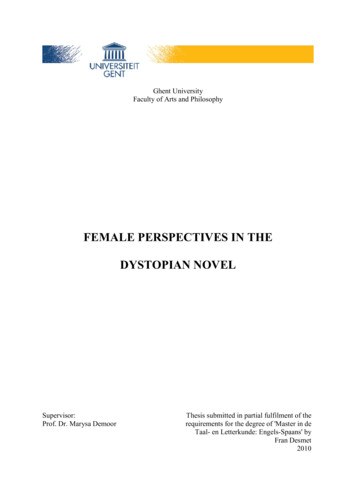
Transcription
Ghent UniversityFaculty of Arts and PhilosophyFEMALE PERSPECTIVES IN THEDYSTOPIAN NOVELSupervisor:Prof. Dr. Marysa DemoorThesis submitted in partial fulfilment of therequirements for the degree of 'Master in deTaal- en Letterkunde: Engels-Spaans' byFran Desmet2010
Desmet2CONTENTSAcknowledgements 3Introduction 41. Utopia, dystopia's ancestor 71.1 The utopian project 71.2 Utopia and the use of language 92. Dystopia, a future nightmare 112.1 From utopia to dystopia 112.2. The rise of the dystopian novel 132.2.1 Historical and political context 132.2.1.1 Science and technology 132.2.1.2. The influence of Nietzsche's and Freud's theories 152.2.2 Famous dystopias 192.2.2.1 We, Yevgeny Zamyatin (1924) 192.2.2.2 Brave New World, Aldous Huxley (1932) 232.2.2.3 Nineteen Eighty-Four, George Orwell (1949) 252.2.2.4 A Clockwork Orange, Anthony Burgess (1962) 282.3 The feminist critical dystopian novel 313. The use of language in feminist dystopian fiction 363.1 Female authors of the nineteenth century and beyond 363.2 Feminist literary theory: the work of Hélène Cixous, Luce Irigaray and Julia Kristeva 393.3 The female voice in dystopian novels 443.4 Three case studies 463.4.1 Woman on the Edge of Time, Marge Piercy (1976) 463.4.2 The Passion of New Eve, Angela Carter (1977) 553.4.3 The Handmaid's Tale, Margaret Atwood (1985) 69Conclusion 77Bibliography 82
DesmetAcknowledgementsI would like to express my gratitude to my supervisor, Prof. Dr. Marysa Demoor,whose guidance has been essential to my understanding of the subject and the completion ofthis dissertation in proper English. I am also grateful to my fellow students, who were in thesame boat as me during the last months and whose mental support has been of inestimablevalue. Lastly, I would like to thank my parents for having given me the opportunity to attendthe University of Ghent for the last four years and without whose love and assistance thiswork could not have been accomplished.3
Desmet4Introduction"In the face of a hostile world, retreat, escape, or simply a compensatory fantasy tocheer yourself up may be reasonable and humanly valuable responses. Holding up a criticalmirror to the present to expose its negative characteristics and effects is also important, andindeed a necessary precursor to developing and pursuing positive alternatives. But it is notenough". (Levitas 14) In this letter to Lucy Sargisson in July 2001, Ruth Levitas speaks of"the possible role of Utopia in the contemporary world", and what the reasons for herpessimism concerning its potential are. (14) According to her, utopias are characterised bytwo functions which both have their merits, namely "compensation (or retreat or escapism)and critique". (14) Although Levitas speaks exclusively of utopias in the context of her letter,this dissertation aims at examining anti-utopian or dystopian narratives in which the criticalfunction of the utopia is taken to its extreme. The turn of utopian to dystopian literature wasalready detectable from the last decade of the nineteenth century onwards, due to varioussocial, political and ideological changes such as "the Marxist critique of capitalism", thedecline of "the unlimited faith in the power of science", and "Darwin's theory of evolution"which knocked man off his pedestal and undermined the theory of God's "divine plan" forhim. (Booker 1994b, 5-7) The explosion of great dystopian fictions, however, is generallysituated over the course of the following century, examples of which are Yevgeny Zamyatin'sWe (1924), Aldous Huxley's Brave New World (1932), George Orwell's Nineteen Eighty-Four(1949) and Anthony Burgess's A Clockwork Orange (1962).Since the dystopian novel partly emerged as a critique of utopian constructions whichoften turned a blind eye to the depressing reality of the world, I have dedicated the firstchapter of this dissertation to the genre of the utopia and the specific features of its languageuse. In the second chapter, I turn to the evolution of utopian towards dystopian literature dueto, for example, radical changes with regard to science and technology and the innovating
Desmet5theories by Sigmund Freud and Friedrich Nietzsche. In this respect, I will also examine thefour influential dystopias I mentioned above in order to take a closer look at the languagewhich is used in it and the purposes which this language use serves.In contrast to these four famous dystopias, the three novels I chose for my case studiesare not merely dystopian but are all written by women and, in addition, they belong to thecategory of the 'feminist critical dystopia' (which are two aspects which do not automaticallycoincide). Dystopias are almost inevitably characterised by a critique on the social andpolitical realities of their day and age, and it seems that more recent dystopian works havepicked up on the growing interest in the position of women in society from the 1960s and1970s onwards. In this period, the second wave of feminism "solidified into a politicalmovement" and women fought against inequality with regard to, for example, sexuality andreproduction, whereas first-wave feminists of the late nineteenth and early twentieth centuryhad campaigned mainly to obtain voting and property rights for women. (Hodgson-Wright 3)In other words, what was at stake in the latter half of the twentieth century was control overwomen's bodies and not so much rights for women in the legal sphere anymore.Due to my investigation concerning the New Woman and marriage for mybachelorpaper, I was already familiar with the fact that women during the nineteenth centuryhad been discouraged to pursue higher education or a literary career because eminent mensuch as Henry Maudsley believed that "it would be difficult for women to combine selfdevelopment or a career with successfully giving birth to and raising children". (Desmet 9) Inaddition, feminist activists often expressed their beliefs through writing, as a result of whichsome male opponents of the New Woman might have seen the act of writing as threatening.(Desmet 7) Because of this, I considered that language could function as an importantinstrument in the attempt to gain control over women and their bodies. This desire to controlwomen surfaces on numerous occasions in feminist dystopias and the three novels which I
Desmet6have chosen to analyse are Marge Piercy's Woman on the Edge of Time (1976), AngelaCarter's The Passion of New Eve (1977) and Margaret Atwood's The Handmaid's Tale (1985).Due to my findings on the New Woman and writing, I decided to examine not only howwomen are represented in these novels but also how language is used to keep women in theirsubordinated position. However, as will become clear in the actual analysis of these casestudies, suppressed individuals can use language to their advantage just as much as oppressorscan. In sum, this dissertation aims at answering the following questions: "How are womenrepresented in feminist dystopias and, with regard to these female characters, how is languageused as an instrument of oppression or liberation in these works?".In order to come to a better understanding of the framework that supports the feministcritical dystopian novel, I dedicated the part preceding the three case studies to the problem offemale authorship in a patriarchal society and, in addition, in a literary genre – the dystopianone – which has been dominated by men for a very long time. In this respect, the work offeminist philosophers such as Hélène Cixous, Luce Irigaray and Julia Kristeva has been of aconsiderable importance. Cixous' writings on 'l'écriture feminine', as well as Irigaray's andKristeva's findings on the relationship between women and language structures form aninteresting backdrop for the analysis of the novels and therefore I will briefly discuss theirtheories in the third chapter. By combining this framework with a thorough examination ofthree literary works, I intend to gain a greater insight into the role of women and language usein these dystopian novels.
Desmet71. Utopia, dystopia's ancestor1.1 The utopian project"We asked him many questions concerning all these things, to which he answered verywillingly; we made no inquiries after monsters, than which nothing is more common; foreverywhere one may hear of ravenous dogs and wolves, and cruel man-eaters, but it is not soeasy to find states that are well and wisely governed". (More 10) When Utopia was publishedin 1516, many contemporary readers assumed that Thomas More had gathered up all histhoughts on a perfect society and had poured them into this work, originally written in Latin.However, the fact that 'utopia' can be read both as 'eu-topia' which means 'the good place' andas 'ou-topia', meaning 'no-place', suggests that More saw this ideal society as non-existent andeven as unattainable. (Levitas 2) In fact, it would rather seem that he aimed at emphasisingthe contrast between the political chaos in his own day and age and the ideas on politics of theUtopians, thus constructing a "platform from which to discuss social issues in Europe".(Cassel vii)The mere description of a blissful, perfect existence actually antedates More's Utopiaby many years. Folk images of the land of Cockaigne, the 'lost city of gold' called El Doradoand the biblical Garden of Eden are just a few examples of utopian fantasy worlds whichseem to have been pervasively present at all times and in all societies. (Kumar 17) Accordingto More's more restricted definition, however, these fictional places are not to be seen asutopias. At a certain point they seem to lose touch with reality, whereas the utopia as it hasbeen understood and practised in the last five hundred years in the West desires to stay"within the realm of the possible". (Kumar 18) By respecting "human and social materials athand", these more recent utopian ideas often succeed in establishing in the reader the illusionof attainability which adds to its strength and attractiveness. (Kumar 18) This modern'realistic' concept of the utopia is in fact founded upon the Enlightenment belief in the
Desmet8eighteenth century that "the judicious application of reason and rationality could result in theessentially unlimited improvement of human society". (Booker 1994a, 4) This kind ofreasoning – which placed high faith in science – bears a resemblance to the theories whichwould later be expounded by Karl Marx and Friedrich Engels in the mid-nineteenth century.Marx' socialism was utopian up to a certain point – although this was strongly denied by itsfollowers –, because it supported precisely those energies which would lead to a change insociety, in contrast with ideologies which aim at preserving "the existing order of things".(Booker 1994a, 3-4)But even utopian narratives in this 'realistic' sense of the word have known aconsiderable evolution since the publication of Utopia in the sixteenth century. In 1623, SirFrancis Bacon's New Atlantis was published, describing the mythical island of Bensalemwhich was "sanctified to God, politically stable, socially conservative, morally pure anddedicated to the pursuit of science". (Bierman 492) Similarly, Johann Valentin Andreaecreated an ideal community in the form of Christianopolis on the island of Capharsalama,where he had been washed ashore after a shipwreck. In City of the Sun (1623), TommassoCampanella depicts his – in this case theocratic – version of a utopian society where all goods,women and children are held in common. Just like Utopia was constructed as a response tothe hierarchical, old-fashioned society of the early modern period, these works "relateimplicitly or explicitly critically to the contemporary societal situation within which they areproduced". (Vosskamp 264) As time progressed these writers functioned as exemplars forauthors who wished to write in the utopian tradition, even if they actually intended to satirisethese works of literature – as is the case with Jonathan Swift's Gulliver's Travels (1726).(Kumar 18) The first target of ridicule Swift chose for this novel is humankind itself and heattacked it by making the protagonist 6 inches high and subsequently 72 feet tall. The otherelement he sought to satirise was a literary genre, namely that of the 'traveller's tale'. The
Desmet9satirical intent of this last novel seems to indicate a significant turn in the evolution of theutopian genre. I intend to take a brief look at older works of a utopian kind and investigatehow this genre evolved through time – eventually leading up to the creation of anti-utopian ordystopian works of literature –, but first I will examine one particular element of the utopiannovel, namely its language, to find out what makes this fictional form unique and worthstudying.1.2 Utopia and the use of languageAccording to Wilhelm Vosskamp, a defining quality of the utopian genre is that it isboth "narrative and imagistic". (264) For a utopian project to be realistic – a subtype whichconstitutes our focus of interest here –, it needs to establish a certain interplay with therealities familiar to the reader. In other words, it "consists of a specific textual mobilisation ofimages of a satirically described reality and the sketching of conceptually counterfactualoppositional images". (264) Because of this, it is important to realise that utopias are "moredirectly connected with historical contexts than other texts". (264) Vosskamp argues furtherthat utopias show three central ideal-typological characteristics, which refer both to textualstrategies and semantic potential. I quote them literally:They have to do with an impulse of negation (in the sense of the utopianconceptions' critical difference in contrast to their respective societal realities);with the literary construction of anticipation (in the sense of anticipating thefuture); and with a dichotomisation of the conjunctive and indicative, in thesense of a category of possibility ('If there is a sense to reality, there mustalso be a sense to the possible.'). (265)
Desmet 10The most important of these three principles is the one that involves negation. Because theyare constructed as reactions to their "respective pre-existing realities", literary utopias arebased upon a "negational operation" of these. (Vosskamp 265)In this respect, the work of Darko Suvin on the poetics of the science fiction genre ingeneral has been of some significance. He argues that utopia is "the socio-political subgenreof science fiction" and that science fiction is characterised by either radically differentcharacters or a radically different context of the story, as a result of which it maintains a closerelationship with other literary sub-genres such as the "Greek and Hellenistic 'blessed island'stories, the 'fabulous voyage' from Antiquity, the Renaissance and Baroque 'utopia'" and even"anti-utopias". (1979, 61; 1972, 372) In other words, utopia, dystopia and science fiction areall characterised by the presentation of otherness and therefore they show a certaindiscontinuity from 'realism'. (Williams 196) As for language, according to Suvin "the hope offinding in the unknown the ideal environment, tribe, state, intelligence or other aspect of theSupreme Good" gives birth to "the possibility of other strange, co-variant coordinate systemsand semantic fields". (1972, 374) However, what characterises both the non-fictional and nonfactual form of the "localized daydream" or utopia – examples of which are respectivelyColombus' letter on the Eden beyond the Orinoco mouth and Swift's Gulliver's Travels – isthat the events are reported in a factual way. This factual reporting leads to the confrontationof an established set of norms with a possible new set of norms, which is known in literarytheory as "the attitude of estrangement". It implies that although the reader or viewerrecognises the subject, at the same time it seems unfamiliar to him or her. (Suvin 1972, 374)In other words, familiar language is used to guide the reader to accept a new, possiblycontroversial setting. This aspect is also considered to be inherent to the dystopian novel,which I will discuss in more detail later on.
Desmet 112. Dystopia, a future nightmare2.1 From utopia to dystopiaSince the very beginning, the invention of these utopian worlds or states as a politicalproject has been received quite critically. Aristotle already commented on his teacher Plato'sThe Republic around 380 BC, attacking amongst other things the sacrifice of "values ofindividual self-fulfillment in order to achieve the values of group cohesion" in this ideal citystate. (Richter 5) This does not immediately imply that Aristotle rejected all utopian views.He expressed his own thoughts on an ideal society in Politics, although the considerations hemade concerning Plato's work somewhat constrained his ideas. (Richter 5)The word 'dystopia' was coined by John Stuart Mill in 1868 and it is derived from theGreek 'dis topos', meaning 'a bad place'. (Milner 827) In the light of this dissertation, then, Ithink it is first of all important to determine what we take to mean by the concept of 'thedystopian novel'. The definition as given by Anne Cranny-Francis is, in my opinion, the mostsuitable and straightforward one: she describes it as "the textual representation of a societyapparently worse than the writer/reader's own". (125) In this respect, the loss of privacy,diversity and change in such utopian models as Plato's as a result of the emphasis on"community, identity and stability" has been feared by many authors, especially during thelatter half of the twentieth century. As Guy Baeten has suggested, it is generally agreed thatthe literary genre of the utopia has been particularly influential during the eighteenth and thenineteenth centuries, whereas the period following the 1950s is rather marked by the rise ofthe dystopian genre. (141)One very famous account of an imaginary dystopian society characterised bydehumanisation and collectivisation is described in Aldous Huxley's Brave New World,published in 1932. Huxley situates his technologically perfect world seven centuries in thefuture, at a time when man has finally "succeeded in eliminating disease, aggression, war,
Desmet 12anxiety, suffering, guilt, envy and grief". (Kass 312)What turns this story into an undisputeddystopia, however, is that all of this has been achieved at the expense of literature and artforms, religious beliefs and even friendship and family relationships. Seeing as how theseelements are what separate us from animals, they are of crucial importance in the lives ofhuman beings. The inhabitants of this world do not even realise what they have lost and,contenting themselves with "psycho-active drugs" and "high-tech amusements", have becomecompletely dehumanised. (Kass 312)Huxley was by no means the first to express such fears about the future in works of adystopian kind. In fact, he was strongly influenced by the Russian Yevgeny Zamyatin whowas the author of the satirical novel We, published 8 years earlier than Brave New World. Inthis work we encounter a similar dehumanisation as a result of complete collectivisation and astrong limitation of "freedom of thought, action and imagination". (Richter 6) Although inmost cases the reader would expect a victory of reason – characteristic of this novel – to bethe foundation for a utopian narrative, this work has been constructed as a protest against thedestruction of freedom and individuality by "rational but heartless fanatics". (Richter 6)Because both Zamyatin's and Huxley's novel have often been considered as representative ofthe dystopian genre I will discuss them in more detail later on, together with George Orwell'sNineteen Eighty-Four and Anthony Burgess's A Clockwork Orange.In 1999, Russell Jacoby claimed in his The End of Utopia that the "utopian spirit – asense that the future could transcend the present – has vanished". (xi) With the growingimportance of the dystopia from the 1960s onwards, we are indeed inclined to say that utopiandreams are not articulated anymore. However, it should not be forgotten that, by showing ushow terrible the future could actually be, the hope for an ideal society still lies hidden beneaththe gloomy exteriors of dystopian narratives. This means that utopias are in fact still presentin our culture, albeit "in the disguise of dystopias". (Mohr 3) This means that the dystopian
Desmet 13genre is indirectly built upon utopian narratives – more particularly by trying to formulate analternative to these sometimes rather naive ideas –, but it is in many ways very different fromits utopian counterpart. In what follows I will investigate the historical and political factorswhich have contributed to the rise of the dystopian genre and take a closer look at some of itsmost famous examples.2.2. The rise of the dystopian novel2.2.1 Historical and political context2.2.1.1 Science and technologyAccording to Walter L. Fogg, the role of science and technology has been quitesignificant in the evolution from the construction of utopian worlds to more satirical utopiannarratives and eventually to dystopian novels. (60) With the rise of modern science in theseventeenth century, the belief that the accumulation of knowledge could lead to a betterworld both socially and morally became more and more accepted. Although this faith intechnological progress seems to have many correspondences with a typically utopian point ofview, it does not desire the stability which characterises an idealised vision of utopia. On topof that, it has been suggested that utopias show "an atavistic desire to return to what isperceived as an earlier better time in history or in one's own life" – while scientific progress isonly oriented towards the future. (Booker 1994a, 5) Nevertheless, science does seem to haveplayed an important role in the development of utopian ideas and its eventual turn todystopian visions.Plato felt that the specialisation of skills and division of labour contributed to theadvancement of society and civilisation, but even he already realised that these developingskills and man's inventions could effectuate great social changes. It is, however, important todistinguish science in Ancient Greece from what was understood by this term in the
Desmet 14Renaissance and in our own day and age. For Plato, the purpose of science was the theoreticalunderstanding of the order of nature. With the rise of modern science in the Renaissance, bycontrast, the emphasis lies on the utility of knowledge, obtained by scientific research. (Fogg59-61) In Bacon's New Atlantis, for example, the application of advanced technologies doesnot only serve very practical ends, but it also adds "a sense of purpose and direction" tosociety. (Booker 1994a, 5) While Bacon still seems to have a very optimistic attitude towardstechnology and social progress, contemporary dystopias and science fiction seem to supportthe idea that "technology is not only beyond the control of society but that man is still largelyunconscious of the profound revolution he is bringing about". (Fogg 60) This tendency wasalready rising in the nineteenth century, when the industrial revolution in Western Europe ledto the exploitation of millions of workmen who were suddenly completely dependent onmachinery and the process of mechanisation. The growing tension between the advantagesand disadvantages of the pursuit of science clearly shows in various nineteenth-centuryutopian visions. In Edward Bellamy's Looking Backward: 2000-1887, published in 1888, theprotagonist suddenly finds himself in a socialist utopia brought about in the year 2000. In thiswork, mechanisation is seen as inducing positive changes and as contributing to "industrialefficiency". (Booker 1994a, 6) Samuel Butler, by contrast, created in Erewhon (1872) afictional country – which was supposedly a critique of Victorian society – where machinery isentirely absent because this is looked upon as potentially dangerous. Butler had actuallyconceived this idea after having read Darwin's On the Origin of Species. By applying theconcept of Darwinian evolution to mechanical instead of biological entities, he introduced thepossibility that machines could develop a consciousness and therefore could become a threatto the human race. (Mudford 14) In sum, as technology was on the rise during the nineteenthcentury contradictory opinions were accumulating and many began to see the dangers ofscientific process along with the benefits of it.
Desmet 152.2.1.2. The influence of Nietzsche's and Freud's theoriesIt has been suggested that not only developments in the field of technology but alsonew ideas in the ideological and philosophical domain – amongst other about thistechnological progress – have contributed to the modern turn towards skepticism anddystopian thinking. When we take a look at the theories of Friedrich Nietzsche and (moreimportantly) of Sigmund Freud, we find many correspondences with contemporary dystopianideas. (Booker 1994a, 7) In what follows I will briefly discuss the importance of their workwith regard to the subject of this dissertation.Already at the very beginning of The Birth of Tragedy, written in 1871, Nietzschearticulates his concerns about the place that science was occupying in the life of man and hismistrust of scientific pursuits in general:Indeed, what does all scientific enquiry in general mean considered as asymptom of life? What is the point of all that science and, even more serious,where did it come from? What about that? Is scientific scholarship perhapsonly a fear and an excuse in the face of pessimism, a delicate self-defenceagainst -- the Truth? And speaking morally, something like cowardice andfalsehood? Speaking unmorally, a clever trick? (6)Further on, he reacts against the growing influence of technology which seems to havebecome a sort of God to man and he warns against man's impulse to achieve completeknowledge and establish final truths, arguing thatIt places an earthy consonance in place of a metaphysical consolation, indeed aparticular deus ex machina, the god of machines and crucibles, that is, theforce of nature, recognized and used in the service of a higher egoism; itbelieves in correcting the world through knowledge, a life led by scientificknowledge, and thus is really in a position to confine the individual man in the
Desmet 16narrowest circle of problems which can be solved, inside which he cancheerfully say to life: "I want you. You are worth knowing." (209-210)By striking out against "the growing mechanisation of life" and even the promotion of scienceas "a new form of religion", Nietzsche anticipates dystopian novels such as Huxley's BraveNew World which is also characterised by a complete mechanisation of human life. (Booker1994a, 7) He goes on to argue that the connection between science and religion is actually avery close one, due to the fact that both strive for a univocal truth. This drive for generalverities could be seen as a general desire for "mastery and dominance", therefore makingtotalitarian regimes possible. (Booker 1994a, 8) In my opinion, Nietzsche does make asignificant point here: if we compare the regime dominated by science and mechanisation inBrave New World with the totalitarian theocracy described in Margaret Atwood's TheHandmaid's Tale, we see that both of these power structures are based upon the attempt topress a definite, invariable truth upon its subjects. Atwood's novel is one of the three workswhich I will investigate in the final part of my dissertation.As I have already mentioned, Nietzsche felt that this obsession with finding the truththrough science "confine[s] the individual man in the narrowest circle of problems which canbe solved". (210) However, to cope with this confinement he felt that art could serve as aweapon of resistance. Martin Heidegger later suggested something very similar in his "TheQuestion Concerning Technology", putting a strong emphasis on poetry in particular:Once there was a time when the bringing-forth of the true into the beautiful wascalled technē. The poiēsis of the fine arts was also called technē. ( ) Why did artbear the modest name technē? Because it was a revealing that brought forth andmade present, and therefore belonged within poiēsis. ( ) The poetical thoroughlypervades every art, every revealing of presence into the beautiful. ( ) Essentialreflection upon technology and decisive confrontation within it must happen in a
Desmet 17realm that is, on the one hand, akin to the essence of technology and, on the other,fundamentally different from it. Such a realm is art.
him. (Booker 1994b, 5-7) The explosion of great dystopian fictions, however, is generally situated over the course of the following century, examples of which are Yevgeny Zamyatin's We (1924), Aldous Huxley's Brave New World (1932), George Orwell's Nineteen Eighty-Fou


